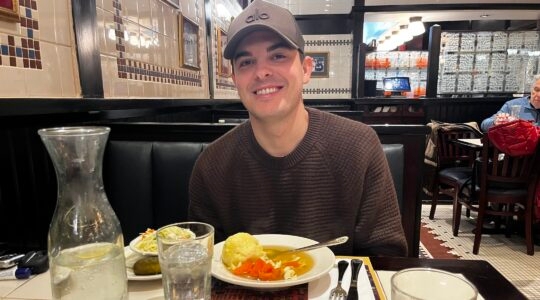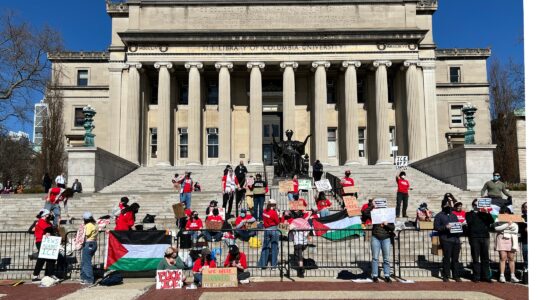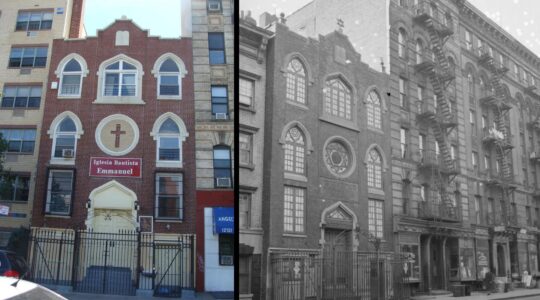President Reuven Rivlin on Monday paid tribute to revered Israeli writer and peace advocate Amos Oz, who died Friday aged 79, at a memorial ahead of his burial later in the day.
“Our beloved Amos. I still do not know how to choose the words,” said Rivlin at the ceremony in a small theater in central Tel Aviv. “Two days have passed and I still do not know whom to talk about — my Amos or our Amos?
“Amos, my friend from the bench at the Jerusalem Gymnasia school, which he didn’t like so much. Amos my neighbor, the boy who didn’t play soccer. But when I had the flu he came to visit me and for three hours explained to me the difference between political Zionism and mystical Zionism. Three hours when we were 14 years old — you can only imagine the kind of headache I had after that.”
Rivlin also examined the impact Oz’s writing had had on Israeli society, and the way in which he touched his readers with his depictions of a life they found so familiar.
“When Amos writes about love and darkness, he writes about me. I am there in the small print. Because, Amos, I feel that not only did you write to me, but you really wrote about me.
“Because of your bravery, your gaze — the most internal and external that there could be. For me and for so many, you lit the streetlights to show the reality of our lives here,” Rivlin said.
“Your most unique fingerprint was your ability to look at things deep inside, but also always a little from the outside,” Rivlin added.
“Not only were you not afraid to be in the minority and hold a minority opinion, but you weren’t even afraid to be called a traitor,” he said of the contrarian writer, who in his later years often clashed with the country’s right-wing establishment. “On the contrary, you saw the word as a title with honor.”
Family members, politicians and Israelis touched by Oz’s works and deeds slowly filed past the black coffin ahead of the ceremony.
Yona Kranz, 74, from the central city Givatayim, vividly remembered the first time he saw Oz decades ago, when the author visited his kibbutz to talk about his first book.
Kranz said he came to say farewell to Oz, who died on Friday, because he “epitomized a myth of an Israel that might have existed and might have not, but I loved that myth.”
“If there is such a thing as a real Zionist, I think he was one,” Kranz said of Oz, whose funeral will take place at 3 p.m. at Kibbutz Hulda, where he was educated.
Oz was Israel’s most widely read and best-known author. He won dozens of awards, including the Israel Prize and Germany’s Goethe Award, and his books have been translated into 45 languages. He had repeatedly been mentioned as a leading candidate for the Nobel Prize for Literature, but it eluded him.
Born Amos Klausner in Jerusalem in Mandatory Palestine in 1939, the city would provide a canvas for many of his works including “Black Box” (1987) and “In the Land of Israel.”
He is survived by his wife Nili and three children.
Considered one of the most accomplished authors in the history of Israeli literature, Oz was also among the country’s most vocal left-wing activists and supporters of a two-state solution.
The comedy of unhappy families
Oz was the only child of parents who emigrated from Russia and Poland to help establish a homeland for the Jews.
As a teen he rebelled against his upbringing, looking to put behind what he felt was his parents’ world that glamorized Europe and the West, and instead was drawn to the young pioneers who built the early state.
“I secretly dreamed that one day they would take me away with them. And make me into a fighting nation too. That my life too would become a new song, a life as pure and straightforward and simple as a glass of water on a hot day,” he wrote.
His austere childhood in the final years of British-mandate Palestine — haunted by the Holocaust and the threat of war for the land claimed by two peoples — would serve as a major theme of his literary works.
So would the suicide of his mother when he was 12, the topic of his heart-wrenching memoir “A Tale of Love and Darkness.” Seeking a break from his life in Jerusalem, he moved to a kibbutz collective farm at the age of 15 and changed his last name to Oz, Hebrew for strength and bravery.
It was while living on the kibbutz, where he would remain on and off for the next 25 years, that Oz emerged as a writer, focusing on daily life and family tribulations.
He completed high school at Kibbutz Hulda in central Israel and returned to the kibbutz after completing his mandatory military service in 1961. While working in the farming community’s cotton fields, he published his first short stories.
After earning a degree in literature from Jerusalem’s Hebrew University, he spent 25 years on the kibbutz, dividing his time between writing, farming and teaching at the community’s high school.
As a reserve soldier in a tank unit, Oz fought in the 1967 Six Day War and the 1973 Yom Kippur War.
“My work is the comedy of unhappy families, not tragedy,” he once said.
His early works, many of which were published in Hebrew by the Israeli Labor Party’s publishing house, included “Where the Jackals Howl” (1965) and “My Michael” (1968).
In a career spanning half a century, Oz published over 35 books, including 13 novels as well as children’s books and collections of short stories, and hundreds of articles on literary and political topics.
Oz’s final novel, “Judas,” was nominated for the Man Booker Prize. A detective story about Jesus and Judas, it was full of the other familiar elements of an Oz novel, including enigmatic characters, the complicated environs of Jerusalem, and endless questions about the State of Israel.
Speaking to The Times of Israel after it was published in 2016, Oz said there was something of his own self in each of the three “Judas” characters, but that was not unusual, he said, given that everything he writes is in some way autobiographical, originating from things he’s heard or seen, dreamed, read or fantasized about.
Peace activist
Oz was a leading voice in Israel’s peace movement and a friend of the late Shimon Peres, a former prime minister and president who won the Nobel Peace Prize for his efforts to reach a deal with the Palestinians. Oz frequently wrote essays and delivered lectures urging the country’s leaders to establish a Palestinian state as part of a peace agreement with Israel.
He was among the founders of Peace Now, a leftist organization that opposes Israeli settlements in the West Bank, and was a leading voice in the 2003 “Geneva Initiative,” an unofficial peace plan reached by leading Israeli and Palestinians. He also was a supporter and activist in Meretz, a dovish Israeli political party.
In recent years, he, along with fellow authors David Grossman and A.B. Yehoshua, became pillars of the country’s peace movement, which has grown increasingly marginalized over the past two decades.
Grossman, like Oz a winner of the Israel Prize in literature, said he felt “the world is diminished a little” with the novelist’s passing.
The New York Jewish Week brings you the stories behind the headlines, keeping you connected to Jewish life in New York. Help sustain the reporting you trust by donating today.




